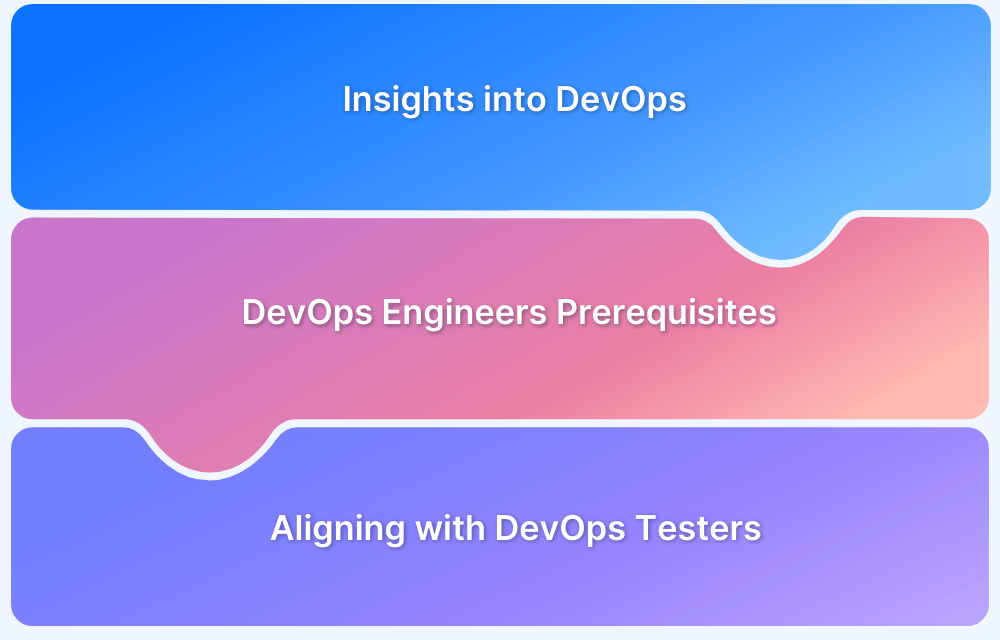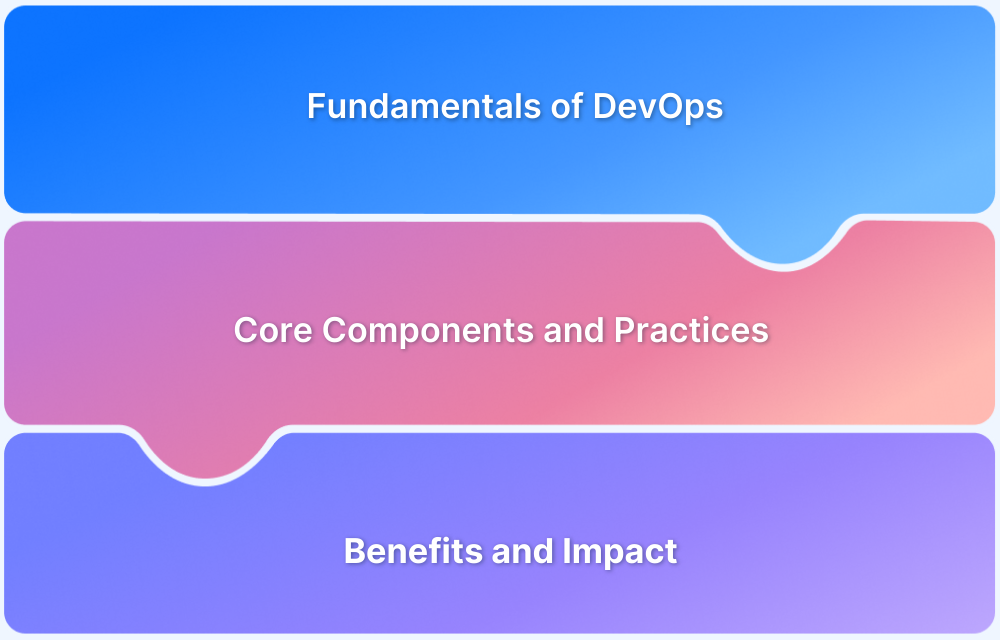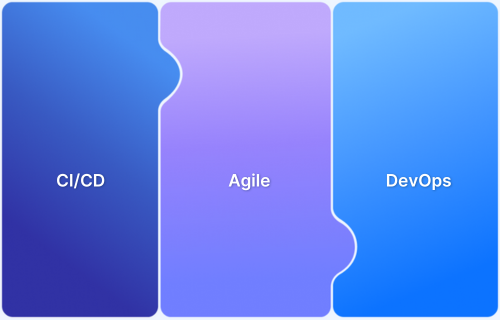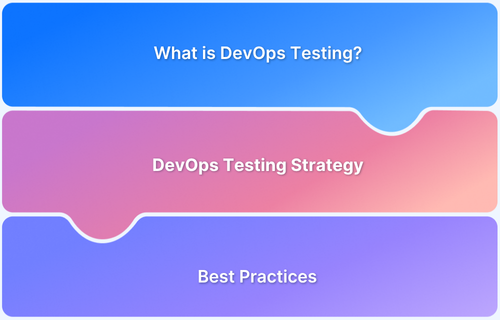With DevOps becoming the norm in software development, organizers must move their existing employees (devs and testers) to processes and methods more aligned with DevOps practices.
DevOps require a fundamental shift in mindset in those using said tools. Developers and testers must change how they perceive their roles and the roles of others in their teams. This requires some sustained training.
Overview
Key Responsibilities of a DevOps Engineer
- Collaboration, Monitoring and Performance Tuning
- Automation, CI/CD, Cloud and Configuration Management
Prerequisites for DevOps Engineers
- Expertise with Programming Languages and Automation Tools.
- Collaboration and Communication
- Working fast and rationally
- Proficiency in Major Cloud Platforms
- Experience with CI/CD platforms
- Ability to use Agile metrics
This article looks at essential prerequisites for DevOps which are the core elements that DevOps engineers must study, internalize, and practice.
What is DevOps?
DevOps applies Agile testing practices to QA and Ops teams, thus streamlining the build, validation, deployment, and development of software. For this purpose, DevOps prioritizes integration, collaboration, and automation between Dev and Ops teams. It seeks to standardize development environments and improve the software development lifecycle’s predictability, efficiency, and security.
When implemented well, DevOps offers the following advantages to development and testing teams:
- Provides greater control over the production environment to developers
- Improves the frequency of deployment
- Lowers failure rate of new software releases
- Improves mean time to recovery
- Increases speed and quality of released software
- Achieves faster time to market
Also Read: What is the ultimate goal of DevOps?
Who is a DevOps Engineer?
A DevOps Engineer is a professional who combines software development (Dev) and IT operations (Ops) to improve collaboration and efficiency in the software development lifecycle.
The primary goal of a DevOps Engineer is to shorten the development process, enhance the quality of software, and streamline deployment and operations.
What are the responsibilities of a DevOps Engineer?
Key Responsibilities of a DevOps Engineer include:
- Collaboration: Facilitate communication between development, operations, and other teams to foster a culture of collaboration.
- Continuous Integration and Continuous Deployment (CI/CD): Implement and manage CI/CD pipelines to automate the testing and deployment of code.
- Infrastructure as Code (IaC): Use tools like Terraform or Ansible to automate infrastructure provisioning and management.
- Monitoring and Performance Tuning: Monitor applications and infrastructure performance, troubleshoot issues, and optimize systems for efficiency.
- Automation: Automate repetitive tasks to improve efficiency and reduce the risk of human error.
- Security Practices: Integrate security practices throughout the development and deployment processes (often referred to as DevSecOps).
- Configuration Management: Manage configurations and settings for servers and applications to ensure consistency across environments.
- Cloud Management: Work with cloud platforms (e.g., AWS, Azure, Google Cloud) to manage resources and services.
Prerequisites for DevOps Engineers
To become a successful DevOps engineer, there are several key prerequisites in terms of skills, knowledge, and experience. Here are some essential areas to focus on:
Note: Devs and testers work in consistent and close collaboration in a DevOps landscape. Often, their roles overlap – testers must have an idea of development principles, and devs must know, at least, the rudiments of testing. Because of this, the prerequisites for DevOps-ready testers and developers will be similar.
1. Expertise with Programming Languages
Any developer will need to know the languages of their craft. But DevOps professionals need to write code and handle software installation, configuration, and validation. They must also be able to write code that enables the automation of essential processes, testing in particular.
- This means they should know what they are doing when working with the most commonly used programming languages – Java, Python, Pearl, etc.
- Scripting is a significant part of a QA’s day because effective DevOps involves a substantial amount of automation.
- For example, Ansible, commonly used for software provisioning, configuration management, and application deployment, uses a Python-based YAML scripting language.
- Anyone seeking to use Ansible with any measure of efficacy will have to know their way around Python.
Learn More: Configuration as Code: Everything to Know
2. Expertise with Automation Tools
The right DevOps automation tools are instrumental in creating an effective system. They reduce the time spent on each task and reduce the risk of human error. DevOps engineers and testers must execute automation at multiple levels – development, testing, and deployment. As mentioned earlier, most automation tools require scripting to work their magic, thus making it a foundational qualification for DevOps professionals.
- Anyone seeking to implement DevOps principles should have considerable hands-on experience with Infrastructure-as-a-Code frameworks, which translates to the usage of configuration management technology.
- Tools like Jenkins, Ansible, Puppet, and Bamboo TeamCity are at the top of this list.
In DevOps, every stage of development is automated in some measure. A DevOps engineer must be familiar with the tools necessary for implementing automation at every stage – Selenium, Jenkins, ELK Stack GIT, Docker, etc. They should also be eager to explore and pick up new tech to stay updated and offer out-of-the-box solutions.
- DevOps testers, in particular, would be served best when looking at a cloud-based testing tool already set up to facilitate CI/CD execution.
- BrowserStack real device cloud provides integrations with popular CI/CD tools such as Jira, Jenkins, TeamCity, Travis CI, and more.
- It also provides a cloud Selenium grid of 3000+ real browsers and devices for testing purposes.
- Additionally, in-built debugging tools let testers identify and resolve bugs immediately.
Read More: Why DevOps Teams Need Cloud-Based Solutions
3. Collaboration and Communication
This is possibly the essential prerequisite of DevOps. One can buy the tools and study to ingest the knowledge, but changing one’s working style takes the longest time and can be most challenging.
- Devs and testers will have to move beyond their predetermined roles when moving to a DevOps style of work.
- DevOps professionals must bridge the gap between developers and IT operations, making communication and collaboration critical skills for them.
- Testers must be involved in a project from the beginning; developers must pay heed to their input and take testing protocols into account when designing code.
- Developers must also run preliminary unit tests on their code before pushing it to version control so that basic bugs can be eliminated.
Similarly, testers must gain development knowledge so that when they encounter a bug, they can identify it better, understand its nature, and return it to devs with some helpful information. Since testers have to design test cases for the Continuous Testing phase of the CI/CD pipeline, they must also understand how development works and what the software must do for its users.
- DevOps testers and developers must be ready to work with each other rather than rushing to finish their part and wash their hands off the matter.
- DevOps roles and responsibilities can be best executed when a team moves in tandem.
- Keep your colleagues informed and consider them when writing code, ideating, and designing features and tests.
4. Speed and Logic
Working fast and rationally is an asset in any professional role. But they are a non-negotiable prerequisite for DevOps engineering. The whole point of implementing DevOps is to speed up software development without compromising accuracy or quality. To do so, DevOps engineers and testers must be able to make spontaneous, rapid decisions based on immediate events. Since these split-second decisions will be responsible for the smooth functioning of the entire team and software quality, the person taking the decision must be able to reason without spending much time.
The prerequisites for DevOps testers, often the same as those for DevOps engineers, ensure that a team can work on the same page in a similar professional and technical direction. Look for these qualities in prospective employees for a DevOps team, or shape training modules for existing employees in a way that lets them learn, excel, and apply these skills every single day.
5. Containerization and Orchestration
Containerization and orchestration are essential skill sets for DevOps engineers, enabling them to build, deploy, and manage applications effectively in modern, scalable environments.
Containerization and orchestration are pivotal skills to effectively manage modern applications in dynamic environments.
- Containers package applications with their dependencies, ensuring they run the same way in development, testing, and production environments. Containers can be created and deployed quickly, facilitating faster release cycles and improving time-to-market for applications.
- Orchestration tools automate the deployment, scaling, and management of containerized applications, reducing manual intervention.
- DevOps Engineers should have proficiency in Containerization Technologies like Docker for creating and managing containers.
- Understanding of container image management, including building and storing images.
- They should have knowledge of Orchestration Tools such as Kubernetes, including its architecture, components, and how to deploy applications using Kubernetes. DevOps should also have
- Experience with other orchestration tools like Docker Swarm or Apache Mesos.
6. Networking and Security
Network and security skills are vital for DevOps engineers as organizations seek to enhance their infrastructure’s resilience and protect against evolving threats. Integrating security practices into the DevOps workflow—often referred to as DevSecOps—ensures that security is a shared responsibility throughout the development and deployment processes.
- DevOps Engineers should have a strong grasp of TCP/IP, DNS, HTTP/S, firewalls, and VPNs.
- Experience with cloud provider networking services (e.g., AWS VPC, Azure Virtual Network) is crucial for managing resources in cloud environments.
- DevOps Engineers should have knowledge of container networking, service discovery, and security best practices for containerized applications.
- Familiarity with tools that automate network configuration and management, such as Ansible, Puppet, Chef, or Terraform, helps streamline deployment and ensure consistency.
- Experience with monitoring and logging tools (e.g., Splunk, ELK Stack) to ensure compliance and detect anomalies.
7. Cloud Services
Cloud services have become a fundamental component of DevOps practices, enabling organizations to leverage scalable, flexible, and efficient infrastructure. For DevOps engineers, proficiency in cloud services is crucial for optimizing the development and deployment lifecycle of applications.
- Proficiency in Major Cloud Platforms like AWS, Azure, Google Cloud: Familiarity with the services and features offered by these platforms, including compute, storage, and networking.
- Experience with Infrastructure as Code (IaC) tools like Terraform, AWS CloudFormation, or Azure Resource Manager to automate the provisioning and management of cloud resources.
- Understanding of cloud security principles, including identity and access management (IAM), data encryption, and compliance requirements.
- Proficiency in using cloud-native monitoring and logging tools such as AWS CloudWatch, Azure Monitor to track application performance and health.
- Familiarity with serverless computing services like AWS Lambda, Azure Functions for building scalable applications without managing the underlying infrastructure.
8. Continuous Integration and Continuous Deployment (CI/CD)
Continuous Integration (CI) and Continuous Deployment (CD) are core principles of DevOps that emphasize automation and collaboration throughout the software development lifecycle. Mastering CI/CD is crucial for DevOps engineers, as it enables rapid, reliable, and consistent delivery of high-quality software.
- Experience with CI/CD platforms such as Jenkins, GitLab CI/CD, CircleCI, or Travis CI for automating build, test, and deployment processes.
- Proficiency in Version Control tools like Git for source code management, including branching, merging, and pull requests.
- Experience with monitoring tools like BrowserStack Test Observability to collect metrics and logs, allowing teams to analyze the performance of applications post-deployment.
- Understanding of how to integrate security checks into the CI/CD pipeline, using tools for static and dynamic analysis.
9. Agile Methodologies
Agile methodologies are fundamental to the DevOps approach, promoting iterative development, collaboration, and flexibility in software delivery. For DevOps engineers, understanding and applying Agile principles is crucial for fostering a culture of continuous improvement and responsiveness to changing requirements.
DevOps Engineers should be familiar with Agile methodologies, Scrum, and Lean practices to work effectively in iterative development environments.
- Experience with Agile project management and collaboration tools like JIRA, Trello, or Asana to facilitate planning, tracking, and communication.
- Experience with Test Management tools like BrowserStack Test Management to manage testing process as per Agile methodology.
- Skills in managing product backlogs, prioritizing features, and breaking down tasks into manageable units for development teams.
- Ability to use Agile metrics to assess team performance and identify areas for improvement.
Conclusion
Prerequisites for being a successful DevOps Engineer encompass a diverse set of skills and knowledge areas that bridge the gap between development and operations. A solid understanding of programming, system administration, cloud computing, and automation tools is essential, alongside familiarity with Agile methodologies and continuous integration/continuous deployment (CI/CD) practices.
As organizations continue to embrace DevOps to enhance efficiency and accelerate software delivery, investing in these foundational skills will not only empower aspiring DevOps engineers but also contribute significantly to their teams’ success.
By cultivating a mindset of collaboration and continuous learning, professionals can effectively navigate the dynamic landscape of DevOps and drive impactful results in their organizations.
In addition to this, it is important to know the importance of testing under real user conditions with Test Automation tools like BrowserStack Automate for a seamless DevOps experience.






